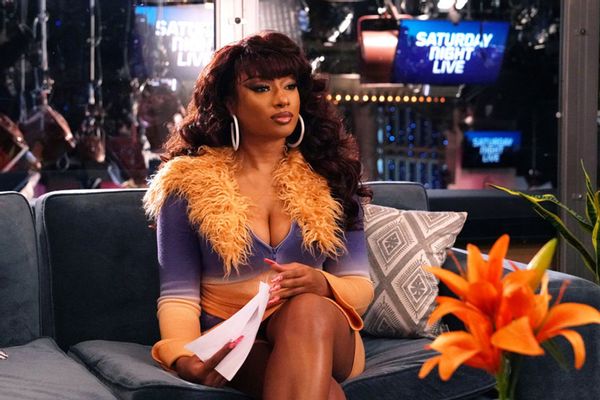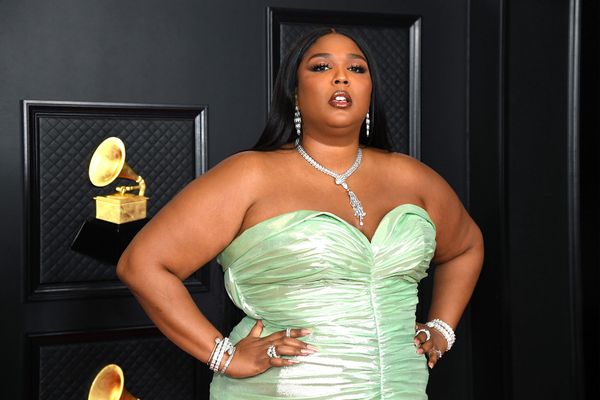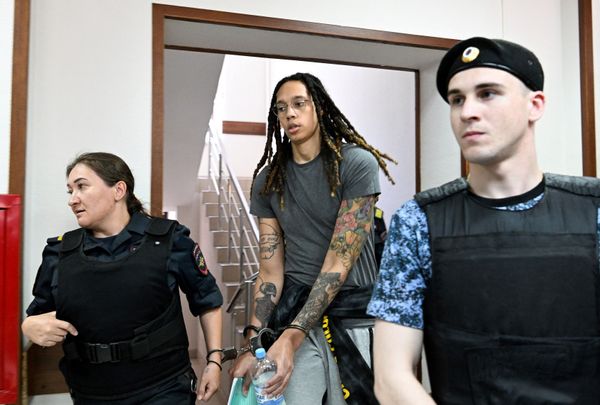
Lizzo scripts a simple question into her current tour performances that doubles as a meaningful pause button, punctuating a set break: "When was the last time you said something kind about yourself?"
It's an effective one because, for the briefest of moments, a sold-out arena full of fans went dead quiet, smacked silent by the question mark hanging in the air. She doesn't leave her faithful hanging for long, breaking the silence by laughing and gently suggesting people change that. Since it's her, they might actually listen.
All told, 2022 has been pretty great for Lizzo, whose real name is Melissa Viviane Jefferson. Her latest album "Special" is multiply Grammy-nominated, and its popularity netted her an invitation to become the first person since the early 1800s to play a crystal flute that was gifted to James Madison, the fourth president of the United States. It's lead single, "About Damn Time," made her TikTok's top music artist of the year and snagged her a spot on Barack Obama's playlist of favorite music from 2022.
Lizzo's commitment to flood the field with positivity swelled into a tsunami this year: "Lizzo's Watch Out for the Big Grrrls," her Prime Video reality series that came out in March, netted her an Outstanding Competition series Emmy. She performed on "Saturday Night Live," went day drinking with Seth Meyers for "Late Night," and is closing the year with the release of her first biographical documentary on HBO Max, "Love, Lizzo" and, on New Year's Eve, a live televised concert broadcast.
Having said that, it's inaccurate to measure how well 2022 went for Black women by simply pointing to her success, as certain people tend to do whenever the inequities Black women face are raised in conversations about systemic injustice. She's a glittering example of excellence, in a range that includes and is anything but limited to Megan Thee Stallion, Brittney Griner, and that other Meg, the one known as the Duchess of Sussex.
All these Black women made headlines outside of the usual election cycle. Whether they're doing so by standing for something, standing up for themselves or simply existing, they are very public examples of the ways misogynoir is used against high-achieving Black women to attacking broader constituencies – including but not limited to Black women en masse.
And 2022 is far from the first year featuring multiple instances through which scapegoating Black women provided an entry point to attacking other marginalized people.
As Catherine Knight Steele, a communications professor at the University of Maryland, explained in a recent interview with NBCNews.com, "being anti-Black woman, using Black women as scapegoats or villains, works for a variety of audiences, white audiences, Black men audiences and, most, unfortunately, in spaces where Black women use misogynoir to distance themselves from the negative implications of being associated with other Black women."
2022 is far from the first year featuring multiple instances through which scapegoating Black women provided an entry point to attacking other... people.
In context, Steele is referring to the way Megan Thee Stallion has been subjected to widespread condemnation, ridicule and disbelief for naming fellow hip-hop artist Tory Lanez as the person who shot her in July 2020. Megan, whose real name is Megan Pete, initially told police who arrived at the scene that she'd cut her feet on glass. In April of this year, she explained to CBS' Gayle King how close the shooting occurred to George Floyd's murder, saying that "for some reason I was just trying to protect all of us, because I didn't want them to kill us. Even though this person just did this to me, my first reaction still was to try to save us. I didn't want to see anybody die."

Part of moving through that process informed the creation of her second critically acclaimed album, "Traumazine," released in August; it landed in the No. 8 position on Rolling Stone's list of 2022's best hip-hop albums. This, too, is part of what could be considered a stellar year, professionally speaking, for her: In the fall, she became the second female hip-hop artist to serve as host and musical guest on "Saturday Night Live" since Queen Latifah did the honors in 2004.
That came long after she premiered in her first Super Bowl commercial, became the first woman to rap onstage at the Academy Awards, took home the Top Female Rap Artist prize at the Billboard Music Awards, slayed the red carpet at the Met Gala, and enjoyed a delightful cameo in "She-Hulk: Attorney at Law." As of Dec. 23, she saw another win: Lanez was found guilty on all three felony charges related to the case, including assault with a semi-automatic firearm, possession of a concealed, unregistered firearm, and negligent discharge of a firearm. He faces up to 22 years in prison.
Surviving all of this took such a toll on her mental health that during her testimony, she admitted, "I don't want to be on this Earth . . . I wish he woulda shot and killed me if I knew I would go through this torture."
This echoes what Meghan Markle admitted to Oprah Winfrey during their CBS interview last year. A shameful number of people didn't believe her either.

For what reason? Does there need to be one, beyond the fact that Markle occupies a Black woman's body? As is the case with Megan Thee Stallion and Lizzo, this leaves her open to figurative and actual assaults and suggestions of violation that would merit punitive consequences had they been made against white women. White western culture has long perpetuated the notion that Black women are less feminine and therefore less worthy of protection.
The corporations that employ figures like Clarkson continue to provide harbor and validation for them. He apologized because he was forced to after thousands of complaints were made regarding his column, which The Sun pulled. As of now, there's no indication that he'll lose his TV job over the controversy, joining a too-large contingent of people who view expressing a desire to harm a Black duchess as perfectly acceptable.
If women of Markle's or Megan Thee Stallion's stature can be branded liars and have their mental health dragged through hell, what hope do ordinary survivors have of receiving true assistance or justice?
Their experiences tell stories about Black women's bodies in other ways too. Lizzo is a fashion icon who constantly faces days when she's simply "minding my fat Black beautiful business," only to be assaulted by evil comments about her weight and looks by women and men, including Black men – particularly antisemitic rapper Kanye West, who likened her body image positivity to a "genocide of the Black race." Has-been comic Aries Spears also went after Lizzo, mainly because people stopped looking for him years ago.

If women of Markle's or Megan Thee Stallion's stature can be branded liars and have their mental health dragged through hell, what hope do ordinary survivors have of receiving justice?
Megan, for her part, brings up the role her body plays in people's willingness to believe her in a Rolling Stone profile that published in June, two months before "Traumazine" debuted. She mused to the writer, "I wonder if it's because of the way I look. Is it because I'm not light enough? Is it that I'm not white enough? Am I not the shape? The height? Because I'm not petite? Do I not seem like I'm worth being treated like a woman?"
WNBA player Brittney Griner might have asked those same questions in reaction to the response to her release after her 10-month detainment. Griner, the star center for the Phoenix Mercury, was detained by Russian officials after their security found vape cartridges containing cannabis oil she says she mistakenly packed in her luggage, and for which she has a prescription. For that, she was sentenced to nine years in that country's brutal prison system.
She's also a 6-foot-9 Black woman whose release after nine months was viewed by right-wing pundits as being at the expense of securing the return of Paul Whelan, a former Marine and white businessman also being held by Vladimir Putin's government.
U.S. officials clarified that wasn't the case, that it was a "one or none" deal offered in exchange for a notorious arms trafficker Viktor Bout, who served less than half of his original 25-year sentence. Doesn't matter. Tucker Carlson reduced the intricacies of the deal to Griner's being prioritized because she's Black and a lesbian. Other smears went lower and dumber, such as TheBlaze's Steven Crowder calling Griner "a tattooed lesbian middling WNBA player," adding, "She's not the best among us."
Griner is an eight-time All-Star player and served as the captain of the U.S. Olympic team, with two gold medals to her name.

Griner was cheered for declaring her intent to play in the upcoming WNBA season, a show of her resilience and defiance, something nobody should expect anyone who survived hard labor under freezing conditions in a Mordovia republic penal colony to undertake. Those who understand what it means to be a Black woman accustomed to crushing society's expectations of her probably get why she's doing it.
Speaking to the burdens Black women bear in terms of moving justice forward, Lizzo admits in her HBO Max documentary, "I wish that wasn't always kind of put on us, because I know how easily that, as a Black woman, I can wear that burden and let it weigh me down like a mule. And I don't want to be anybody's f*****g mule."
In 2022, she definitely could not be called that – not while using her explosive success to challenge stereotypes that have always been hung around the necks of women like her. 2022 was her year, and Megan Thee Stallion's, Markle's and Griner's, in very different ways and through disparate experiences, some of them publicly painful. But each in her way and by her example shares her life and story as a means of constructing emotional shielding for themselves and others who share some part of their experiences – as survivors, and people who are vilified and persist, as Black women.
Therefore, Lizzo's question asking when the last time was that you said something kind about yourself is designed to hit a Black person differently and Black women very specifically, than every other type of person in the stadiums she's filling.
It's a good question, connected to the advice Megan provides on her track "Plan B" by warning, "Ladies, love yourself 'cause this s**t could get ugly" and the examples Markle and Griner set by refusing to retreat. Not all of them would make every website's year-end superlative list, but considered together, they may be the most accessible examples of counteroffensives against misogynoir in 2022 – and very likely in 2023, too.







